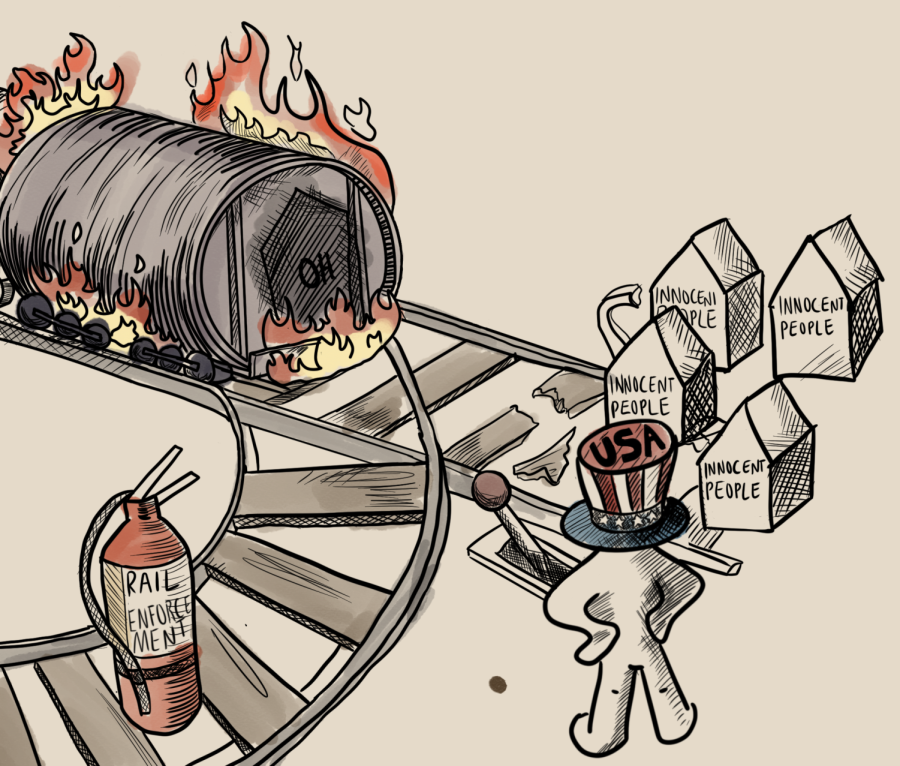The Modern Trolley Problem
March 26, 2023
For residents of East Palestine, the decline of COVID-19 had alleviated much of the anxiety associated with the small Ohio village’s response to public health emergencies; they lowered their guard as the rest of the world did. But hopes for healthful normalcy went up in smoke at about the same time 38 Norfolk Southern train cars did, on Feb. 3, having derailed and released toxic chemicals from five tankers into the village’s air and water.
It is the responsibility of government to provide each of its constituents with those necessities essential to survival, in order to lay the framework for a functioning and free society. These necessities are food, water, shelter, and needless to say, air. In East Palestine, minimal federal regulation of rail, poor railroad working conditions, and delayed executive response has threatened access to every one of these rights.
One of the toxic chemicals in question is vinyl chloride, of which officials opted to control the burn . When burned, vinyl chloride yields hydrochloric acid and phosgene, which have been used as gasses in chemical warfare.
Other chemicals spilled and burned include butyl acrylate, ethylhexyl acrylate, ethylene glycol monobutyl ether, and isobutylene. There is little to no research regarding how these chemicals interact with each other, adding to the frightening uncertainty of current events in East Palestine.
Despite the many vagaries of the chemical spill, there is one thing we know for sure: exposure to the chemicals being burned in East Palestine right now has extremely adverse effects on human health. Residents of the village are reporting nausea, headaches, irritation, and vomiting, among other symptoms.
There are no answers. Fears of unsafe drinking water linger, as well as the long-term effects of exposure to contaminated air. At a Feb. 15 town hall, where hundreds of Ohio residents gathered to voice their concerns, company officials backed out of attendance at the last minute. People in the area are angry, and sick—despite the EPA telling them that their air and water is completely safe.
Though the East Palestine derailment is unique in its widespread coverage and detrimental impact on the local environment, the issue of railroad mismanagement is not. In fact, as recently as March 4, another 28 Norfolk Southern cars derailed near Springfield, Ohio. Though there was apparently no hazardous material onboard, this frightening turn of events reveals the extent to which American demands for rail reform have fallen upon deaf corporate ears, with the reason being a fundamental lack of accountability within the industry.
“What you’ll find, though, is that whenever there’s an incident, you can almost be certain that someone wasn’t following the rules. So you have a lot of these federal regulations and laws, but the question is whether they’re fully followed or not. And then there’s always been a fairly contentious relation with the unions, who are an extremely powerful player politically. They’re also a very major player in all of this,” said former president of Metro North and current transportation consultant, Howard Permut, in an exclusive interview.
When Permut refers to unions, he speaks of the historically dominant role labor advocates have held in political decision making surrounding rail. Railroad unions are particularly actors today, as Biden signed a bill in Dec. 2022 which would prevent an economy-damaging railroad strike. Critics argue that prolonged labor mobilization will likely increase the inefficiency and unsafety of rail development. However, more often than not, unions mobilize as a result of their company’s sidestepping regulations which make accidents, like the two most recent Ohio derailments, more common.
“The main issue is that there aren’t enough safety regulations for freight companies from the federal government, like there are restrictions for passenger rail. In passenger rail, sensors are much more frequent, so they can detect issues and stop them more efficiently. Obviously on MetroNorth, they have sensors on every stop, or sometimes twice between stops, depending on how long it is. Freight companies often don’t have this, because they do not like spending money, but they love making money,” said resident train enthusiast Theo Knauss ‘24. “It’s just a matter of implementing federal regulations, but it’s difficult to get policy written for this, because it’s all privately owned. So it’s just hell, essentially.”
The tug-and-pull relationship between federal decision makers and railroad giants has posed a threat to American welfare since the 1890s, but we may be entering an entirely new era of uncertainty. Now, unions and labor advocates are mobilizing to curb the spread of a new approach to railroad economics, which is quietly swiping the jobs of tens of thousands of workers.
“About ten years ago, this guy by the name of Hunter Harrison came up with something called ‘precision railroading.’ That’s a fancy term for not investing a lot and giving money to Wall Street, so he made himself a fortune, then passed away. Anyway, there’s a belief that I suspect to be true that between that and COVID, the railroads have reduced their workforce dramatically. There’s really a question as to how much safety has been compromised because they’ve cut ⅓ of the workforce,” said Permut.
It is unacceptable that only now that railroad mismanagement is tangibly affecting the environment and welfare of American citizens are we beginning to demand higher levels of transparency within the railroad industry. To ensure the minimization of rail mishaps like that which has continually affected the residents of East Palestine, the federal government must enforce both a safe and effective level of staffing in the industry and the standardization of tanker and rail construction.
Americans should not have to trade their safety for the survival of the free market; productivity should never come at the expense of citizen welfare.




